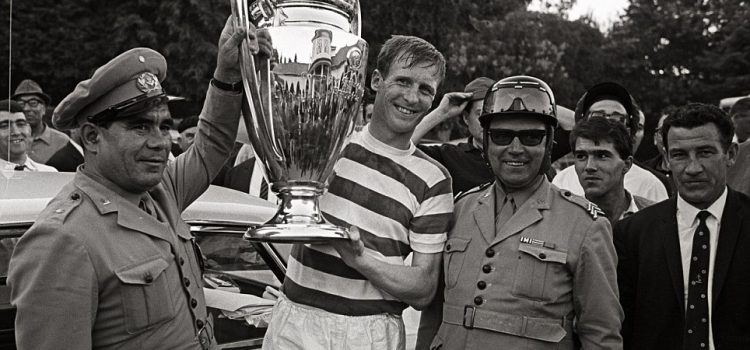1955: Hibernian v Rot Weiss Essen
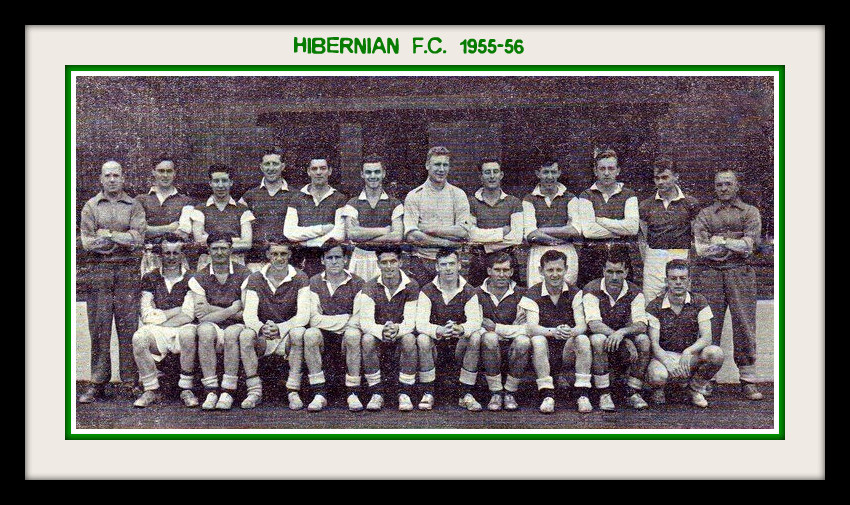
Edinburgh team Hibernian, known more popularly as Hibs, became the first British football club to compete in the European Cup. English sides declined to enter the inaugural contest, but there was more interest north of the border.
However, reigning Scottish Champions Aberdeen did not enter. Hibs were selected partly because of their reputation for flowing football, but more importantly due to the fact that they were one of a handful of British teams to then have floodlights; European matches were generally played in the evening.
The first round opponents were West German Champions Rot Weiss Essen. The Scots crushed the Germans 5-1 on aggregate. Their next opponents were Swedish club Djurgarden IF who they easily beat 4-1 over two legs.
Hibs’ run finally came to an end in the semis against Reims who went on to lose the opening European Cup Final against Real Madrid. This would be Hibernian’s last foray into the competition, though they did claim the notable scalp of Barcelona in the 1960/61 Fairs Cup Final.
The following year Manchester United became the first team to represent the English League. They also progressed to the semi-finals, but were beaten by Real Madrid. British involvement in the fledgling European Cup was still beset by snobbery towards foreign football. During the 1950’s there was a growing realisation that England and Scotland were not the only powers in the World Football. Both countries had made disappointing debuts in the World Cup, and it was clear that they were falling behind the likes of Hungary, Uruguay, and Brazil.
For the first decade no UK club managed to reach the final. Hibs, Spurs, Dundee, and Liverpool all made the semis once, and Manchester United narrowly missed out on the final three times. Gradually clubs began to adapt to the differing style of Continental football, and it was Celtic who became the first to reach a European Cup final in 1967.
1967: Celtic v Inter Milan
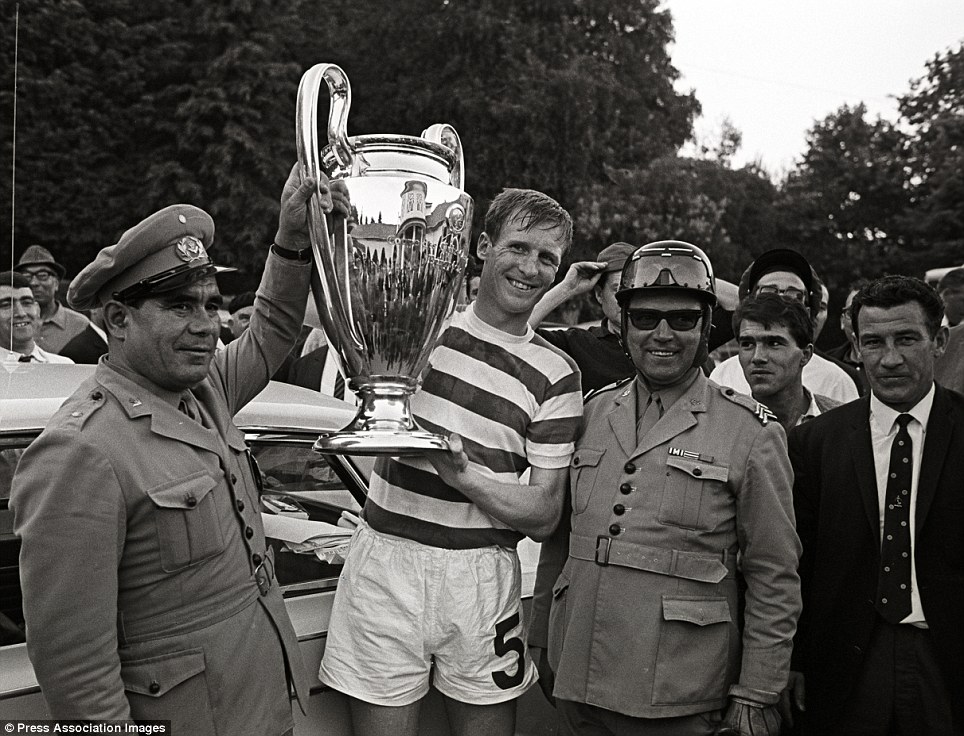
Celtic’s first ever run in the Cup, would prove to be their most successful. After beating Dukla Prague in the semis, Celtic faced Inter Milan. The Italians had knocked out reigning champions Real Madrid in the quarter-finals, and went into the final as strong favourites.
Inter played a typically Italian brand of defensive football, but the underdogs were quietly confident. Their manager Jock Stein had assembled a team of locals (every player was born within 30 miles of Parkhead), who knew each others’ games inside out. Although star striker Joe McBride was missing, Celtic still felt their attacking ethos could overturn even the most defensive of teams.
Just six minutes into the match, Inter were awarded a penalty, which Sandro Mazzola converted; it was their only shot on goal. The Glaswegians then had a seemingly fair goal disallowed by the referee, and two decent penalty calls turned down. Nevertheless Celtic refused to panic, and instead kept faith in their creative game.
Just after the hour-mark the Scots finally broke down the efficient Italian defence, with Tommy Gemmell blasting the ball through the keeper’s hands. Celtic continued to push forward, and Steve Chalmers grasped the winner six minutes from time, much to the delight of the Lisbon crowd who had been won over by Celtic’s beautiful.
The Scottish side became the first team from Northern Europe to be crowned Champions of Europe, and the eleven players that day were immortalised as the ‘Lisbon Lions’.
1968: Manchester United v Benfica
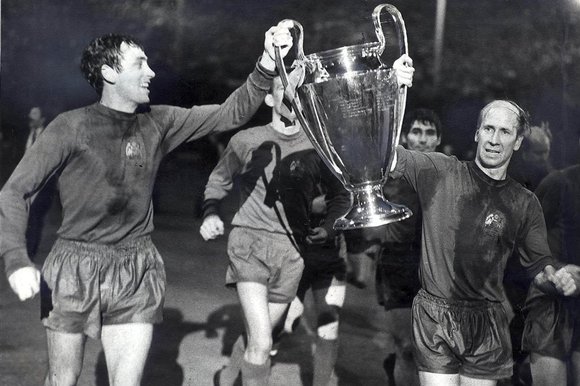
The year following Celtic’s triumph, Manchester United became the first English club to reach the European final. Man United did have the benefit of effectively playing at home, as the match was played at Wembley. It was a classic United starting eleven with such household names as George Best, Bobby Charlton, and Nobby Stiles on the team-sheet, though Dennis Law was injured.
The most famous player in the Benfica squad was Eusebio, the Black Panther, who had so impressed at the World Cup in England two years earlier. The Benfica team was made up entirely of Portuguese citizens, whilst United’s starting eleven was composed of players from the British Isles.
The first half passed largely without incident, but early in the second, Charlton put the Red Devils in front. Benfica scored as equaliser through Jaime Graca with twenty minutes to go, to set the Wembley crowd on edge.
During the first ninety minutes there was little between the two teams, yet once extra time began, Man United began to dominate. Charlton bagged another goal, before Best and Brian Kidd secured the cup for Man United. It had been a long journey for the Manchester club following the Munich Air Disaster a decade before.
Though ironically, having captured the European Cup, the club went into decline. The next quarter of a century would be one of consistent under-achievement.
1970: Celtic v Leeds
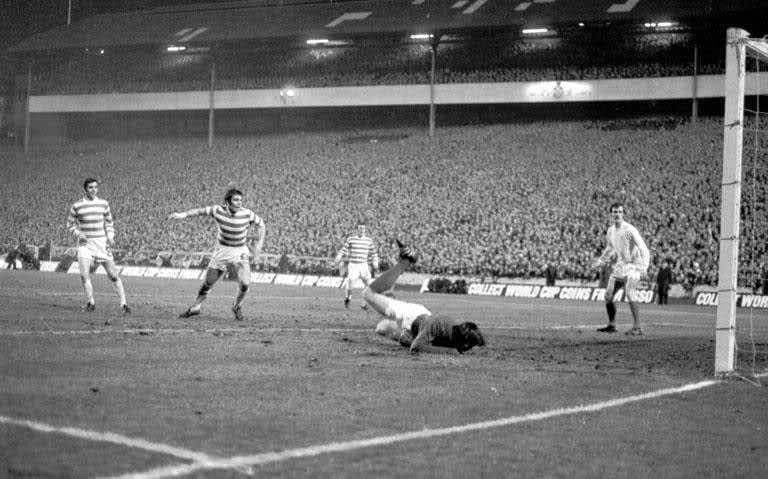
This was the first time the champions of England and Scotland had met in Europe. The media, on both sides of the border, hyped up the ‘Battle of Britain’. The English press seemed utterly convinced that Leeds would ease through the tie, despite Celtic’s European pedigree. However Don Revie’s men lost the opening leg at Elland Road nil-one through a first minute goal from George Connelly.
Celtic elected to play the corresponding fixture at Hampden Park, Scotland’s international stadium. Such was the interest that even thousands of supporters of Celtic’s arch-rivals Rangers bought tickets to cheer on the men in green and white. The extraordinary attendance of 136,505 remains a European club record, and since there is currently no stadium on the continent with a larger capacity, it will probably remain a record for the foreseeable future.
Leeds faced an uphill struggle, though their most expensive player, Allan Clarke, cost £165,000, over three times the paper value of the entire Celtic team. The Yorkshire team were clearly fired up for the match, and they started the better with Scotsman Billy Bremner, a childhood Celtic fan, temporarily silencing the mammoth crowd by scoring for Leeds early on.
Even that fine goal could not hold Celtic back. Early in the second half John Hughes and Bobby Murdoch settled the tie in Celtic’s favour with a goal apiece. Though the star of the show was the irrepressible Jimmy ‘Jinky’ Johnstone who ran the Leeds defence a merry dance all night.
Celtic was expected to win the final, but the tag of favourites did not suit the Bhoys, and they were defeated 2-1 by Feyenoord. It was the last time a Scottish team would reach just exalted heights. For Leeds it was the worst defeat in their history.
1978: Nottingham Forest v Liverpool
Today the meeting of English clubs in Europe is a common occurrence. Yet before the introduction of the Champions League format in which, ironically, non-Champions could now compete, such meetings were extremely rare. In fact this was the first fixture between two English clubs in the European Cup.
Liverpool, the reigning champions of Europe, took on Nottingham Forest who’d won their only league title the previous season. Manager Brian Clough was at the peak of his career, and there was no one his team feared. Clough, probably the most revered English manager of all time, had earned his reputation at nearby Derby County, where he had guided the Rams to the English League title.
His Forest players were still the underdogs, as Liverpool had already amassed two of their five European Cups. The first leg was played at Forest’s City Ground, and it proved to be the decisive match. Garry Birtles opened the scoring midway through the first half, and then played a part in Colin Barrett’s second.
In the return leg, Liverpool just couldn’t find a way through the Forest defence despite the partisan backing of the Anfield crowd. Forest got all the way to the final that year beating Malmo to become the smallest team ever to triumph in Europe.
The following season they retained the European Cup, becoming the only side to have been crowned champions of Europe more times than they won their domestic league.
1982: Aston Villa v Bayern Munich
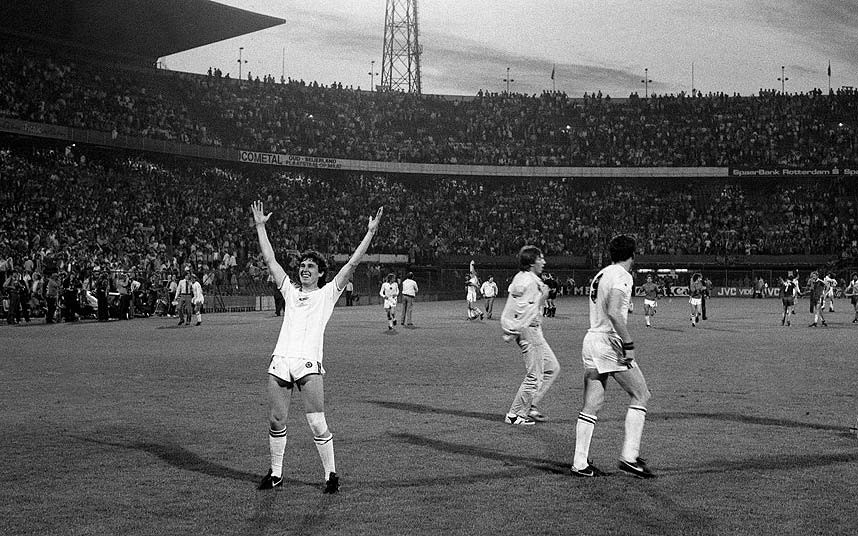
Such was the dominance of English clubs in Europe at the time, Aston Villa’s surprise capture of the Cup is not widely acclaimed. In the decade between 1975 and 1985, it was assumed that whoever won the English League would have a great chance of triumphing in Europe.
Ron Saunders who had masterminded Villa’s English Championship the season before, resigned mid-campaign. Furthermore, the English Champions had made one of the poorest defences of league title in English football history, finishing the 1981/82 season in eleventh position.
Saunders’ replacement, Tony Barton, is one of the forgotten men of English football, but he led the Midlanders to the European Cup Final in Rotterdam. There they faced European giants Bayern Munich.
The contest itself was not a classic. Jimmy Rimmer was injured ten minutes into the final. He had been the substitute goalie during Man United’s 1968 European Cup victory, and would again miss out. His replacement was Nigel Spink, a future Villa legend who was making only his second full appearance for the Birmingham team. He was probably the finest player on the pitch, making a string of fine saves.
The tie was settled in the 67th minute when Peter Withe converted Tony Morley’s cross, to score the only goal.
1999: Manchester United v Bayern Munich
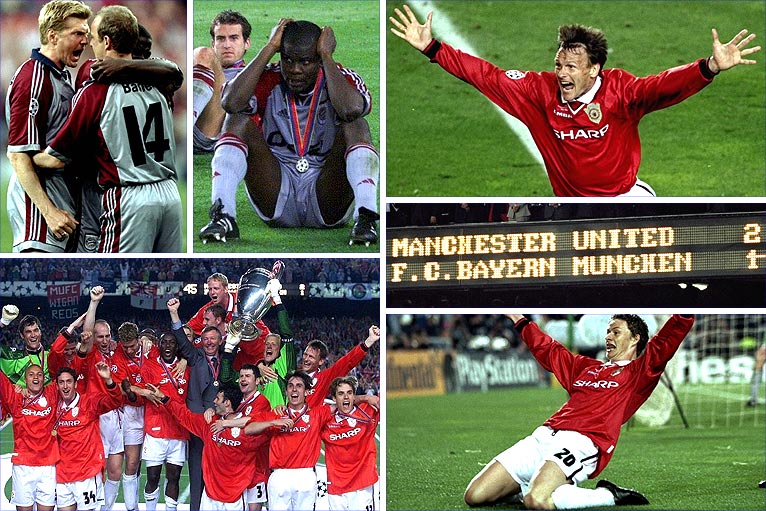
Man United can be considered fortunate to have even been in the final. The previous season they had finished runners-up in England to Arsenal, but the 1998/99 season was the first time that the competition had been extended to include non-Champions.
United’s greatest achievement was beating Juventus 2-3 away from home in the second-leg of the semi-final. This was the first time that manager Alex Ferguson’s had reached the final of Europe’s greatest competition.
In truth the Manchester team also played poorly in the final, but luck was on their side. Mario Basler opened the scoring seven minutes into the match with a well taken free kick. The United midfield was playing distinctly below par. Beckham was working hard, but ineffectively, and the Reds were sorely missing Roy Keane and Paul Scholes. Bayern continued to create the better chances with Basler and Stefan Effenburg coming close.
Just as it appeared that Mancunian luck was running out, an amazing turnabout occurred. In injury time, substitute Teddy Sheringham scored from a corner. Lightening then hit twice. United were again awarded a corner, and another substitute, Ole Gunnar Solskjaer, stabbed in an unlikely winner.
The luckless and bewildered Bayern players were left slumped on the pitch as the Reds celebrated.
2005: Liverpool v A.C. Milan
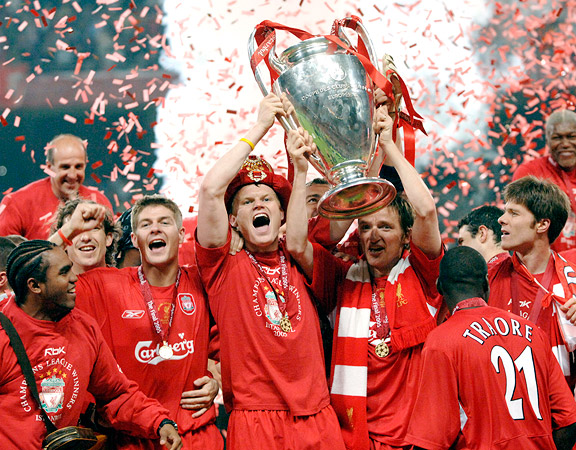
Between 1977 and 1984, Liverpool dominated continental football. They picked up four European titles, and as a result are the most successful British team in Europe. Regardless, the actual finals from Liverpool’s Golden Age were not particularly exciting affairs. The same could not be said of the 2005 final. Since the 1980’s the Merseysiders had experienced a marked decline, and their appearance in the final had not been widely predicted.
Manager Rafa Benitez, considered an expert in European football, had persisted with his controversial squad rotation system, which seemed to serve the club well during a congested fixture list at the end of the season.
Captain Steven Gerrard was one of just two Englishmen to play that evening, the other being Jamie Carragher. Veteran Italian defender Paulo Maldini scored inside the first minute, and the Argentine Hernan Crespo netted a brace during the closing stages of the first half to leave Liverpool trailing by three. However in the space of just six minutes, Gerrard, substitute Vladimir Scimer and Xabi Alonso each scored a goal.
Having thrown away a three goal lead AC Milan seemed incapable of regaining the initiative. Extra time passed uneventfully, and the clash was to be decided by penalties. Serginho, Pirlo and Shevchenko all missed for AC Milan, leaving Scimer to slot home the winning penalty.
The unfancied Liverpool team, considered by many to be a shadow of their former selves, had pulled off the greatest comeback in a European Cup Final.
2008: Manchester United v Chelsea
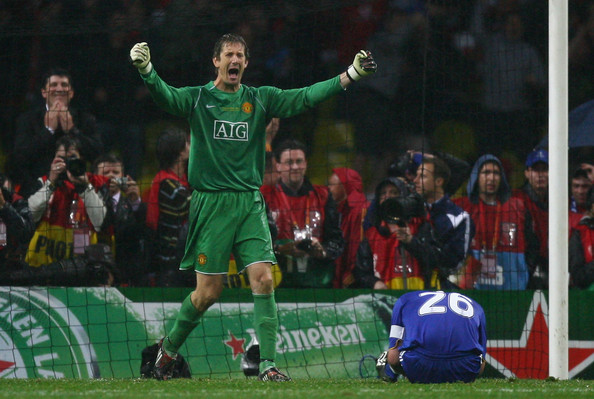
With the introduction of the Champions League format, fans were becoming accustomed to all English ties in Europe. Nevertheless, this was the first all English final. Chelsea was led by caretaker gaffer Avram Grant, whose squad had just missed out to Man United in the league.
The star of the United team was the brash but highly skilful Christiano Ronaldo who scored in the twentieth minute. Chelsea stalwart Frank Lampard then equalised at the end of the first half.
The next talking point did not arrive until extra-time, when Ivorian Didier Drogba was sent off , becoming only the second player to be red-carded in a European Cup Final. Yet ten-man Chelsea hung on for penalties.
In a dramatic ending Christiano Ronaldo missed his penalty. Captain John Terry had the chance to seal victory, but the Chelsea legend slipped as he approached the penalty spot and misdirected his kick wide.
The contest now went to sudden death with Anderson and Kalou both scoring for their respective clubs. Ryan Giggs held his nerve to score, meaning Nicolas Anelka’s miss condemned Chelsea to defeat.
2012: Chelsea v Bayern Munich
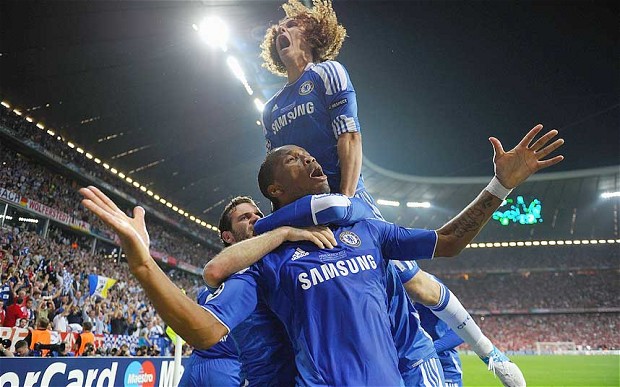
Chelsea have often been accused of buying their success. Their Russian billionaire owner Roman Abramovich has ploughed hundreds of millions of pounds into the club since taking over in 2003. Yet Chelsea had never quite managed to conquer Europe.
During the 2011/12 domestic season, the Londoners had a comparatively poor time in the English league, and Abramovich had sacked manager Andres Villas-Boas. His temporary replacement was the inexperienced Roberto Di Matteo. However the Italian caretaker boss steered his team towards an unlikely European Cup Final against Bayern Munich.
Most punters were expecting an all-Spanish affair, but Bayern defeated Real Madrid in the semis, and Chelsea produced an even greater upset by eliminating Barcelona.
The German side went into the contest as clear favourites, and were fortuitous in having home advantage (Bayern’s Allianz Arena had been selected as the venue of the Champions League Final earlier in that year).
Despite this, Bayern Munich had a woeful record against English finalists. Bayern held the upper hand throughout the match and with seven minutes left on the clock, Thomas Muller scored what looked like the winner. Didier Drogba was, however, in no mood to concede defeat in his last appearance for the Blues. He scored with a trade mark header with two minutes left on the clock.
In extra-time, Drogba then gave away a penalty. Arjen Robben’s poor strike was saved by Petr Cech, and neither team could produce a winner. Penalties were required to settle the tie. Mata missed Chelsea’s first, but his side were able to ride their luck.
Olic and Schweinsteiger both failed to convert their spot-kicks, leaving none-other-than Didier Drogba to send the keeper the wrong way and finally bring European glory to Roman Abramovich.
Written by Brian Heller
Like O-Posts on Facebook
You can also follow O-Posts on Twitter @OPosts

